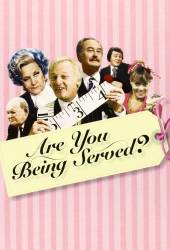Question: Captain Peacock explained the real reason why he and Miss Hazelwood were late for work but, why did they both decide to hide the truth and make up a story as to why they were late? Why not just come right out and admit it? If they had, it would have been excusable.
Question: If Mrs. Slocombe had squatters in her new flat, why didn't she simply call the police and have them removed?
Question: Does anyone know why Wendy Richard (Ms. Brahms) is the only one not wearing blackface for the musical number at the end of the episode?
Answer: In minstrel shows there was also a stereotype of black men preying on white women, so that's probably why she was not in black face. Also, Mrs. Slocombe is in blackface because she is an older, stout woman and she fits the "mammy" stereotype.
Answer: In Britain, there was the show Black and White Minstrels which was very popular until the late 70s. The men were all blacked up, but the women weren't - hence Black and White Minstrels. It's been a while since I saw the episode to know if Mrs Slocombe was blacked up as well, but technically she shouldn't have been.
Question: What does the phrase "The things you see when you haven't got the gun" mean?
Answer: It usually just means seeing something weird or unusual, perhaps something someone wouldn't believe you saw without proof. The phrase is usually "haven't got your gun", although some people replace "gun" with "camera." Basically think about a hunter spending all week in the woods looking for the biggest [fill in the blank] and the one day he goes out into the woods without his gun and then finally sees it.
Answer: I would also interpret it (metaphorically speaking) as when someone has a gun in hand, there is a specific target or intent they are so fixated on, that they block out everything else around them. Without a gun, one would see their environment more comprehensively, noticing details they would otherwise overlook. To clarify, someone who has too narrow or fixated a focus or perspective, misses other important things going on around them that might affect their opinions or conclusions.
Question: How is Catch-as-catch-can played?
Answer: Catch-as-catch-can is a style of wrestling in which the wrestlers are allowed to use methods which are illegal in most traditional wrestling matches. These include tackling, tripping, and holds below the waist. The humor lies in how the character of Mr. Humphries references it in his line: "I was known as Hugger Humphries. They had to pull me off people. I was the 'catch as catch can' champion of the Barley Road Mixed Infants."
Question: Why does Captain Peacock always ask a customer if they're being served as soon as they get out of the lift? The customer has just arrived, so Captain Peacock is already aware they haven't been served yet.
Answer: It's just a turn of speech, a very prim and proper way of asking "Do you need any help?" Being such a stuffed shirt, and in a store as old-fashioned as Grace Brothers, Captain Peacock would naturally affect an air of superiority and high-class language when speaking to customers.
Question: What was the chronological order in which there were new male employees working at Gentleman's Department after others had left the show? Was it Mr. Grainger, Mr. Lucas, Mr. Tebbs, Mr. Spooner, in that order? Or was it another way and who where they replaced by?
Answer: The Gentleman's Department went as follows: Mr. Grainger left after series 5 and was replaced by Mr. Tebbs, who stayed until series 6. He was replaced by Mr. Goldberg for series 7. Meanwhile, Mr. Lucas also left in series 7. Mr. Goldberg left after series 7. Temporarily there were only two employees in the department. At the start of series 8 Mr. Spooner started working. The "third" position was filled first by Mr. Grossman then Mr. Klein. Incidentally, Young Mr. Grace stayed for the first 7 series, replaced by old Mr. Grace. Mr. Mash was on for the first 3 series, replaced by Mr. Harmon.
Question: When everyone is having the meeting about adapting their approach to customers in an American fashion. Captain Peacock says that he heard that Austin Reeds had an unusual position. What was it?
Answer: He actually said that they had an "interesting position," which doesn't refer to any job in particular but is merely a set-up for Mr. Humphries' innuendo-laden response: "That rumor's been going around for some time."
But what is the "interesting position"? That is what I want to know. Does it mean that employees at Austin Reeds often dress up to try and get more customers or something else?
The interesting position just means an interesting job - it doesn't matter what it was. As mentioned previously, it is just a setup for Mr. Humphries' response.






Answer: That wasn't possible in 1972. Until recently squatting was a civil offence in the UK, not a criminal one, and removing squatters was a complex and time consuming business.